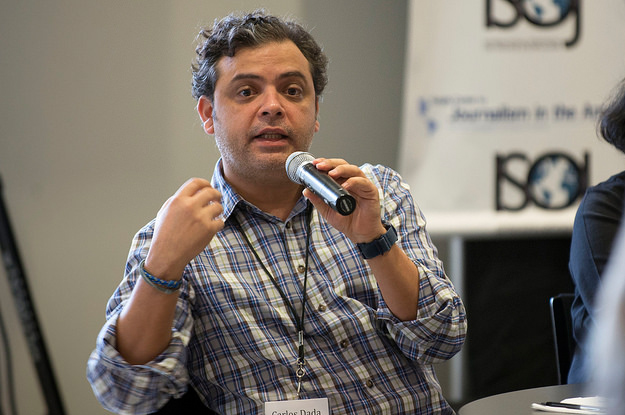This article is adapted from AQ’s print issue on youth in Latin America. See the rest of our Top 5 Latin American journalists.
Carlos Dada’s life, like that of so many others from El Salvador, was punctuated by war. He left when he was 10 years old, as civil war broke out. He returned as an adult to find a nation devastated by years of violence, wrestling with corruption and poverty.
To this place he brought the boldest proposition: He founded El Faro (The Lighthouse) an investigative, online newspaper. This was 1998. Less than 2 percent of the population of El Salvador had access to the Internet. The country was reeling from 12 years of conflict. Its journalistic establishment had little interest in airing dirty laundry. But there it was: Latin America’s first online-only publication.
Since then, El Faro has lived up to its name, becoming a light in the darkness. “I would love to say that I am a visionary, but I think that El Faro was only a way to meet a demand,” Dada, 43, told AQ.
El Faro made its mark with deeply reported, well-crafted investigative stories that went to the heart of El Salvador’s problems: violence, poverty and corruption. Their investigative journalism has earned Dada and his team honors including the Maria Moors Cabot and the Anna Politkovskaya awards; Dada himself has been awarded the John S. Knight Fellowship, among others. Their readership grew to Central and South America, the U.S. and Europe.
But Dada and El Faro have also faced the consequences of confronting those in power. In 2012, they received threats — from gang members and government officials — for revealing that a truce between the Salvadoran government and the gangs offered prison privileges like conjugal visits and phone access to gang bosses.
In 2014, Dada left the leadership of the website: “I was finally promoted to reporter,” he said, laughing. He spent the past year writing a book on the murder of Óscar Romero, the Archbishop of San Salvador who was assassinated while celebrating Mass during the country’s civil war, and covering neighboring Honduras.
Since the website’s founding, the medium has changed, he acknowledges.
“Today, it’s the algorithms that decide how information is presented on media platforms,” he said.
But there is Dada, still pushing readers to click and overcome, yet again, the prevailing logic.
—
Lezcano has covered Latin America for 12 years as a freelance journalist. He is currently based in Rio de Janeiro.





